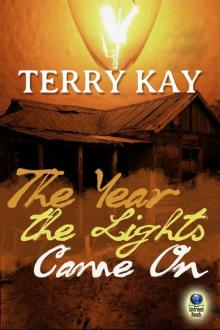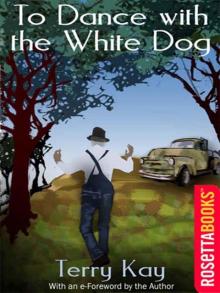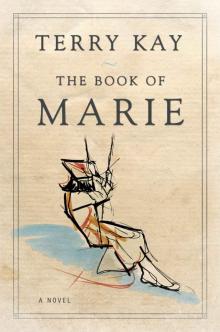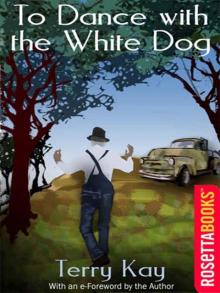The Book of Marie Read online
Also by Terry Kay
Song of the Vagabond Bird
The Seventh Mirror
Bogmeadow’s Wish
The Greats of Cuttercane
The Book of Marie The Valley of Light
Taking Lottie Home
Special K: The Wisdom of Terry Kay
The Kidnapping of Aaron Greene
The Runaway
Shadow Song
To Whom the Angel Spoke: A Story of the Christmas
To Dance with the White Dog
Dark Thirty After Eli
The Year the Lights Came On
The Book of Marie
A Novel
Terry Kay
MERCER UNIVERSITY PRESS
MACON, GEORGIA
© Terry Kay 2015
Published by Mercer University Press
A Note on Style
This book is presented in both first person and third person perspective—a technique I have never before employed. To maintain focus while writing, I decided to use quotation marks in the first person dialogue and to eliminate them in the third person. It was, for me, a sensible and helpful exercise and I have elected—with the publisher’s consent—to continue the style in print. I hope it does not create a distraction for the reader.
Terry Kay
The words of this book are dedicated to my eight grandchildren—Brooks, Jordan, Cheyenne, Tommie, Winn, Casual, Brandon, and Wyatt. My wish is for them to find peace in the giving and taking of the lives they choose to follow, and to be as blessed by the miracle of caring as their Papa has been blessed by them.
Contents
Prologue
ONE
TWO
THREE
FOUR
FIVE
SIX
SEVEN
EIGHT
NINE
TEN
ELEVEN
TWELVE
THIRTEEN
FOURTEEN
FIFTEEN
SIXTEEN
SEVENTEEN
EIGHTEEN
NINETEEN
TWENTY
TWENTY-ONE
TWENTY-TWO
TWNETY-THREE
TWNETY-FOUR
TWENTY-FIVE
Author’s Note
Many years ago, I wrote a novel that I titled A Prayer for Dreamers. My intention was to examine the sweep of social change in the American south from post-World War II to the mid-1990s, as reflected in the civil rights movement.
The story focused on two characters, a young white boy and a young black boy, born in the same Georgia community on the same day in the same hour.
Originally, there were three parts to the book—the boys’ friendship in their childhood years, their separation by the circumstance of time and cultural tradition, and, finally, a half-century later, their eventual reuniting.
Only part one was published. It was called The Runaway. For reasons I have never understood, the publisher shied away from the complete story. (I do know, of course, that writing is a business and the romantic notion of putting words on paper, for whatever purpose, gets a wink and a smile when it comes to making business decisions.)
Still, rejection stings and writers of all genres understand what it means to back up and begin again, to delete (or file away) and to toy with new directions guided by different points of view. That is what I did after my original manuscript was edited (or truncated). I began again. And again. And again. I rewrote the unpublished portions from several perspectives over a number of years, until I realized the story was so close to my personal history, it hindered the efforts. (Nothing blinds a writer as much as the glare of reflection.)
Although that personal history no longer clutters The Book of Marie as it once did, it does remain embedded in the story. I could not have written it otherwise. I was a child—a white child—of the segregated south. As a young man, I witnessed the confrontations and the promise of desegregation, earned in events of high drama. As a mature adult, I have been elated, and saddened, by the good and bad efforts to assimilate hyphenated cultures into something worthy of that eloquent prayer spoken by Martin Luther King, Jr. on August 28, 1963, in front of the Lincoln Memorial in Washington, D.C.
Unhappily, I have accepted that Dr. King’s dream is still mostly a dream, with one glad exception: the relationship of one person with another person works, as it always has, and it does not matter what the hyphen separates or binds together—Irish-American, African-American, Polish-American, Japanese-American, et cetera. There is no hyphen in caring or in friendship.
Eventually, that is what I found in this book—a story of people embracing other people one-to-one, a love story. The theme of social change is still present, but more as background than as issue.
For those familiar with The Runaway, a caution: this is not a sequel to that story. (A follow-up, perhaps, but not a sequel.) I changed names of characters, placed them in different situations and watched as they began to express different personalities. Events I had not previously considered appeared magically, and that is the true joy of writing: you are not telling a story; you are discovering one.
I hope readers find elements of their own heritage in The Book of Marie. I hope they know, or knew, a Marie Fitzpatrick. I hope they know, or knew, a Moses Elder and an Art Crews and a Littlejohn Curry and an Alyse Lewis and a Tanya Berry and a Jovita and a Lamar and a Hugh and a Wormy and a Sally and a Toby and an Amy and a Rachel, and all the others who peeked up from the word-machine I use for writing. They were there for me because, over time, I have known each of them, or fragments of them. In great part, they are the make-up of my life.
The Book of Marie
Prologue
1962
She heard the fire before seeing it—the sound of it crawling in the walls like a playful scurrying of mice. And then she heard pounding at the front door—far off, it seemed—and with the pounding, a man’s voice shouting, Get out!, shouting, Fire! Fire!
All of it happened in the bewilderment of a groggy awakening, each moment piling hard against the moment in front of it—the sound of crawling fire and the pounding at the door and the shouting, and then the heavy smell of smoke, and through the window above her she could see the jerky dancing of flames on the outside weatherboarding, and from across the room she heard the whimpering of a voice—Littlejohn’s voice—calling for her, saying, Mama, Mama, Mama.
The flames broke through the inside wall near her bed. A thin orange tongue of fire licked against the ceiling. Smoke swirled. She could smell the scent of singed hair and heart-of-pine wood and gasoline. She tried to move, but could not, her muscles as useless as a person paralyzed by polio, the weight of the smoke pinning her to the bed. She thought of sleep, of how good sleep would be, and the thought caused her to close her eyes. Then, as if by magic, she sensed herself rising from the bed until she was suspended against the ceiling, swirling with the smoke in a boneless smoke body. She peered down on the bed below her and she watched a man—she knew him to be Doke Wansley, a drinker and a no-good—lifting her from the mattress, shouldering her like a sack of grain. She saw Doke Wansley turning, bulling his way across the room to a door.
She heard again, Mama, Mama. The words were screamed. And then she lost consciousness.
In the years that followed, she would go often to the memory of the fire. It was never long lasting, appearing mostly in fragments of flashing pictures, and sometimes she wondered if thinking of it was more a habit of her brain than something sealed inside her soul. It could be that, she reasoned, for she remembered it always in the same manner—awakening to the fire around her, unable to move, being carried from the house, Littlejohn’s cry for her, fainting on Doke Wansley’s shoulder. She remembered being revived by neighb
ors bringing water to her face with the palms of their hands, their hysterical cries coming as loud as the sirens of fire trucks and police cars. She remembered the heat of the fire and the bright colors of flames playing leapfrog across the roof ridge of the house. She remembered her children crowding around her, all but Littlejohn. Burned, they had said of Littlejohn. Had tried to go back into the house to find her, but the smoke had choked him down. Doke Wansley had dragged him out and he had been taken to the doctor’s house. She remembered the sickness of terror. And then, in the way of incident leaping time, she remembered all the moments after the fire when she saw the crinkled skin of burn-scars on the right side of Littlejohn’s neck and face and also the disfigured ear. The marking of fire on Littlejohn’s face and neck and ear kept the story alive in the lore of Overton long after the gossip of it had become as age-wrinkled as those who remembered it.
The gossip had been mostly about the fire-setter—guessed-at names said whisper-light for fear of reprisal. She had been asked hundreds of times if she knew the truth of it. She did not, she had replied with honesty. She knew—or believed she knew—the reason the match was struck, but she kept the thought to herself. There had been enough talk about her and about the young white girl, the outsider, and also about the boy, coming back the day after the fire as he did, causing such bitter talk so soon after the picture of him showed up in the newspaper.
The reason for the fire was in all of it, yet she did not offer her opinion. Not then. Not ever.
In the early 60s, many things were best left alone if you were colored.
Time would even things out, she believed.
Maybe not in my life, but someday, she said to those who still listened to her, nodding placating nods out of the kindness of friendship. Among themselves they had talked in a more pitying manner, saying the answer had been around since the beginning, saying if the sheriff had paid any attention to Doke Wansley, the name of the fire-setter would have been known before the smoke cleared.
Yet, after almost half a century, the truth of the fire would matter very little, for the ash of it had long blown away and weeds and scrub trees had taken root where the house had been.
The land had healed.
Doke Wansley had died.
The sheriff, whose name was Julian Overstreet, had also died.
Doke had said he saw the fire-setter. The sheriff had said Doke was half-drunk when it happened—which, by all accounts, was true—and he was not about to take the word of a half-drunk. A half-drunk’s word in court was as wobbly as his step.
Doke had said the fire-setter was running away carrying a gasoline can with him, running so fast a man would think the Devil was close behind.
White or colored? Julian Overstreet had asked Doke.
White, Doke had said too quickly.
How you know that? the sheriff had demanded. You that close up on him?
Not real close, Doke had answered cautiously.
Then you don’t know for sure, the sheriff had insisted, using a voice that made Doke rethink his words.
Uh, nossir, I guess not, Doke had confessed.
How I know you didn’t set that house on fire, Doke? Julian Overstreet had asked. You could’ve gone over there and pissed on the back porch and lit it with a kitchen match and it would’ve caught fire like a kerosene log from all that rot-gut you been drinking. How I know it weren’t you?
Those who were there, watching, listening—some who would be chief among the gossipers in the following years—had said they saw Doke go scared, saw him take a backward step and duck his head. Had said they remembered hearing him mumble, Nossir, it weren’t me. I was just coming down the road, going home, when I seen it.
Was it burning hard? the sheriff had pressed.
Just a little bit when I first seen it, Doke had mumbled. Then it pick up, real fast. I could hear it. Sound like the wind when the wind whip up out of nowhere. And I could smell it, too. Smell the gasoline.
That when you saw the man running?
Uh-huh. Yessir. That’s when.
Going which way?
That way, Doke had answered, pointing east on the road, where the road took a sharp turn to the left behind a stand of pine trees, leaving Milltown.
Had a gas can with him?
Uh-huh. Yessir.
You didn’t see nobody else?
Nossir.
Didn’t see no car?
Nossir, but they could have been one. Thought I heard a car door slam.
You didn’t go look?
Nossir. I went down to the house and started knocking on the door, trying to get everybody out. Weren’t no time to do nothing else.
That when you kick down the door?
Yessir.
Anybody see you around there? the sheriff had asked, and a number of people—neighbors—had answered for Doke, saying, Yessir, he’s telling you right. He went in the house and started running out the children and then he got out Jovita and the littlest boy. Yessir, they be dead now except for Doke.
And Julian Overstreet had left it at that, knowing it would be touchy to make a great fuss over some burned-down colored house in Milltown. It was 1962. With all the bellowing about the colored going to school with whites, putting doubt on the fire-setter being a white man was as far as he needed to take it.
Besides, the day had been full enough with talk about the Bishop boy having his picture plastered on the front page of every newspaper from Atlanta to Hong Kong. It was a shame, the way that boy had changed, but everybody knew it was the girl’s doing, the girl putting nonsense in his head. Her kind would be the ruin of the country if she had her way about things.
Goddamn agitators.
ONE
2004
On the evening before the letter arrived, he had hosted a surprise birthday party in his home for Grace Webster, using the ruse of a faculty committee meeting to review plans for a summer literary tour of Ireland—Dublin to Donegal.
The meeting would not take long, he had promised Grace with apology. A matter of dotting i’s and crossing t’s. Admittedly an aggravation, yet something needed to be done before Christmas holidays.
The party had been childish. Guests pouring out of back rooms wearing party hats, yelping. Grace in shock, covering her mouth with her hands to hold back squeals. A dinner of southern food, demanded by the party-planners, saying it was it his duty since he and Grace were the only southerners in the department. Giving in, he had prepared fried chicken and ham-hock turnip greens, black-eyed peas covered with tomato gravy, butter-soaked grits, cornbread sticks, a sweet potato soufflé, and iced tea heavily sweetened with sugar.
The food had caused laughter and jesting, as he expected it would. In Vermont, much of the food was as foreign as escargot would have been at the dining table of his parents’ home in Georgia.
After the dinner, gifts had been presented. Books. Music on compact disks. A scarf. Gloves. A basket of products from the fields and woods of Vermont. And, last, skimpy lingerie pulled from a box having no giver’s name on it, making a moment of awkwardness, a tittering of nervous giggles, leaving the guests to wonder and to speculate, most of them believing the lingerie was from Gere Contrada—Gere’s sexual orientation being suspect and Grace being young and seductively pretty. Grace saying, Oh, goodness…in her soft Tennessee voice, her voice as blushed as her face.
And then the playing of the party games, designed by Gere. In the games was the tease, the warning, that would be found in the letter.
The games had been intentionally adolescent, the sort played by children on the cusp of being adults, and he had suspected it was Gere’s way of jesting with Grace over her age. Just a baby, Gere had cooed.
One game had required each guest to write a fortune in the manner of those found in Chinese fortune cookies, and to place it in a box. Grace had to do the drawing, reading each fortune aloud, then assigning each fortune to one of the partiers. We’ll see how well you know us, Gere Contrada had said.
Th
e fortune Grace Webster had assigned to him was: The destination you seek is waiting for you at the start of your journey.
Gere Contrada had laughed. My God, Cole, do you even remember where that is?
He had answered, Barely.
The next day, the letter arrived.
The way his name was handwritten on the envelope—graceful, looping letters—told him it had been addressed by a woman.
The postmark was from Overton.
The return address was 151 Franklin Street.
Inside the envelope was an announcement of the fiftieth reunion of the class of 1955, Overton High School. It read, in centered print:
For those of us
Who made it this far,
Now is the time
To see who we are.
So make your plans
To include this date
And be prepared
To tell us your fate.
The date advertised was April 16, 2005. The place was DeWitt Kilmer’s Recreation Hall. A parenthetical held the word Restored.
A note, also handwritten in graceful, looping letters, was included. It read:
Cole,
Your sister Amy gave me your address. All of us hope you can make it to the reunion. It’s been 50 years. Can you believe it? Maybe you don’t know, but I married a man named Jody Pendleton from Ila. He died three years ago of a heart attack. I still miss him, but I have our children (3 of them, 2 boys and a girl) and 5 grandchildren, and they keep me believing I’m young, even if the mirror won’t let me hide from the truth. I’ve worked at the library for 22 years now. It’s something I enjoy, and it’s taught me the pleasure of reading. As I recall, you were our reader during our school years. I wish I had started younger. A lot has happened to all of us and I’m sure most of us never believed our lives would have turned out the way they have. We’re all proud of you, so please, please make plans to come, and bring any mementoes you may have saved—from report cards to letter jackets. We want to make a table display.

 The Year the Lights Came On
The Year the Lights Came On To Dance With the White Dog
To Dance With the White Dog The Book of Marie
The Book of Marie After Eli
After Eli To Dance with the White Dog: A Novel of Life, Loss, Mystery and Hope (RosettaBooks into Film)
To Dance with the White Dog: A Novel of Life, Loss, Mystery and Hope (RosettaBooks into Film)